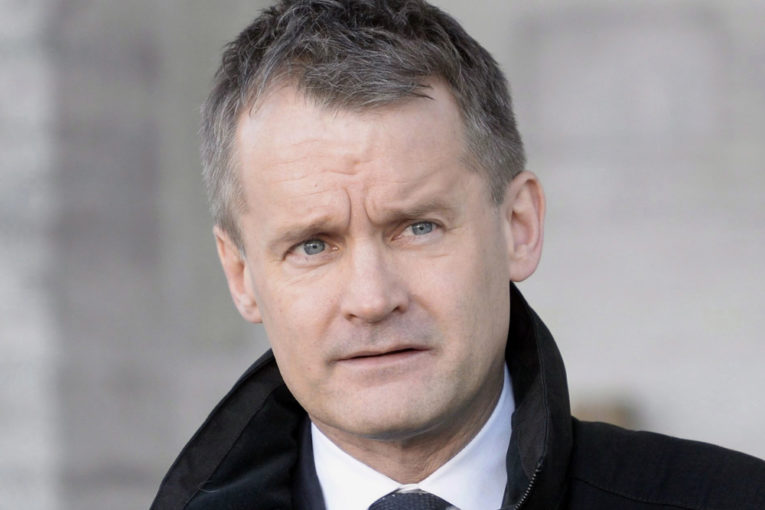
In a largely unanticipated move, Prime Minister Justin Trudeau on Wednesday announced that his longtime friend Seamus O’Regan, the Liberal MP from St. John’s, Newfoundland, would serve as the next Natural Resources Minister.
The appointment puts O’Regan in charge of a sensitive portfolio at a time when the oilpatch is struggling and the Liberals failed to win a single riding in either Alberta or Saskatchewan.
As minister, his responsibilities will extend beyond energy to developing policies around all natural resources, including mining and forestry. All three sectors contribute to Newfoundland and Labrador’s economy, which has historically also supplied a portion of the workforce for the Alberta’s oilsands.
O’Regan, who holds a Master of philosophy from University of Cambridge and previously worked in media, is not strongly associated with the resources sector.
“He is best known to Canadians for his ten years as co-host of CTV’s Canada AM,” the second line in the bio featured on his government website had read until Wednesday afternoon.
O’Regan was swept into office as a Liberal in the 2015 election, winning 58 per cent of the votes, and then won re-election this fall with 51 per cent of the votes in his riding.
Amarjeet Sohi, the previous Minister of Natural Resources, hailed from Alberta, but failed to retain his riding last month. That left an open question as to who Trudeau could name as the next minister of natural resources, given that Western Canada’s resources sector has been struggling.
Winnipeg MP Jim Carr, who previously held the role was not appointed to a cabinet post because he is battling cancer. But Trudeau designated Carr a “special representative” for the Prairies, who can advocate on behalf of Alberta, Saskatchewan and Manitoba.
“I think that at this point, the fortunes of the domestic oil industry depend first and foremost on global oil prices, and next on getting one or more of the pipelines completed,” said Douglas Porter, chief economist at BMO Capital Markets.
The Keystone XL Pipeline would carry oil from Alberta’s oilsands to Nebraska, but Porter said its future is largely dependent on what happens in the U.S., where Democrats in the House of Representatives have called for a review of the federal agency that would regulate it in the wake of an oil spill in North Dakota.
Meanwhile, the Crown-owned Trans Mountain pipeline would twin an existing line that carries oil from Alberta to the coast, and is under construction.
“Other than making sure it moves forward, I’m not sure what can be done quickly on that front,” said Porter.
The process of building not just pipelines, but most infrastructure in Canada has become highly politicized, he noted.
Chris Bloomer, president of the Canadian Energy Pipeline Association, said O’Regan has to be an advocate for the domestic energy industry within the cabinet and make clear that the oil and gas sector is facing a crisis.
“One of the biggest stumbling blocks is how do we move forward and change the narrative around this industry,” said Bloomer.
He added while oil prices need to rise, and the pipelines need to be built for the industry to recover, it also needs to be able to attract investment.
Making sure the industry is treated as a long term part of the economy will be a crucial part of the role, said Bloomber.
O’Regan, a former on-air personality and close confidante to Trudeau, may be able to help communicate messages to the western region where dissatisfaction with the federal government runs strong amid a flailing economy.
His own province does have a sizeable resources sector.
Pierre Gratton, president of the Mining Association of Canada, said that Newfoundland and Labrador have gained importance as a mining jurisdiction during the past decade. Vale operates a giant nickel mine, Voisey’s Bay, Rio Tinto operates an iron ore mine, and there are other large operations as well.
“He’s a good choice for us and we look forward to working with him,” Gratton said via email.
Of course, few issues are quite as politicized as resource development in a world where climate change has increased scrutiny on global emissions and pollution is taken more seriously; and O’Regan is likely to hear from environmental groups that want him to proceed cautiously.
Jamie Kneen, communications and outreach coordinator for MiningWatch Canada, said it was an interesting choice.
“I’d hope that he’ll take the opportunity to ask questions rather than just take the lead of departmental officials and industry lobby groups,” said Kneen via email.
Financial Post
• Email: [email protected] | Twitter: GabeFriedz
You can read more of the news on source
